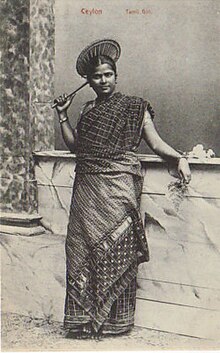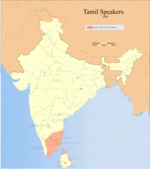
Back Tāprabanan Tamilas ANG تاميليو سريلانكا Arabic تاميليو سريلانكا ARZ শ্রীলঙ্কান তামিল Bengali/Bangla Tàmils de Sri Lanka Catalan Sri-Lanka-Tamilen German Tamil cingalés Spanish تامیلهای سریلانکایی Persian Sri Lankan tamilit Finnish Tamouls srilankais French
ஈழத்தமிழர் இலங்கை தமிழர் | |
|---|---|
 A postcard image of a Sri Lankan Tamil woman, 1910. | |
| Total population | |
| ~ 3.0 million (estimated; excluding Moors and Indian Tamils) | |
| Regions with significant populations | |
| 2,270,924 (2012)[1] | |
| ~300,000[2][3][4][5][6] | |
| ~120,000 (2006)[7] | |
| ~100,000 (2005)[8] | |
| ~60,000 (2008)[9] | |
| ~50,000 (2008)[10] | |
| ~50,000 (2022)[11] | |
| ~30,000 (1985)[12] | |
| ~30,000[13] | |
| ~25,000 (2010)[14] | |
| ~25,000[13] | |
| ~24,436 (1970)[15] | |
| ~20,000[13] | |
| ~10,000 (2000)[16] | |
| ~9,000 (2003)[17] | |
| Languages | |
| Tamil (Sri Lankan dialects) | |
| Religion | |
Majority
Buddhism[19] | |
| Related ethnic groups | |
| Part of a series on |
| Tamils |
|---|
 |
|
|
Sri Lankan Tamils (Tamil: இலங்கை தமிழர், ilankai tamiḻar or ஈழத் தமிழர், īḻat tamiḻar),[21] also known as Ceylon Tamils or Eelam Tamils,[22][23] are Tamils native to the South Asian island state of Sri Lanka. Today, they constitute a majority in the Northern Province, form the plurality in the Eastern Province and are in the minority throughout the rest of the country. 70% of Sri Lankan Tamils in Sri Lanka live in the Northern and Eastern provinces.[1]
Modern Sri Lankan Tamils descend from residents of the Jaffna Kingdom, a former kingdom in the north of Sri Lanka and Vannimai chieftaincies from the east. According to the anthropological and archaeological evidence, Sri Lankan Tamils have a very long history in Sri Lanka and have lived on the island since at least around the 2nd century BCE.
The Sri Lankan Tamils are mostly Hindus with a significant Christian population. Sri Lankan Tamil literature on topics including religion and the sciences flourished during the medieval period in the court of the Jaffna Kingdom. Since the beginning of the Sri Lankan Civil War in the 1980s, it is distinguished by an emphasis on themes relating to the conflict. Sri Lankan Tamil dialects are noted for their archaism and retention of words not in everyday use in Tamil Nadu, India.
Since Sri Lanka gained independence from Britain in 1948, relations between the majority Sinhalese and minority Tamil communities have been strained. Rising ethnic and political tensions following the Sinhala Only Act, along with ethnic pogroms carried out by Sinhalese mobs in 1956, 1958, 1977, 1981 and 1983, led to the formation and strengthening of militant groups advocating independence for Tamils. The ensuing civil war resulted in the deaths of more than 100,000 people and the forced disappearance and rape of thousands of others. The civil war ended in 2009 but there are continuing allegations of atrocities being committed by the Sri Lankan military.[24][25][26] A United Nations panel found that as many as 40,000 Tamil civilians may have been killed in the final months of the civil war.[27] In January 2020, President Gotabaya Rajapaksa said that the estimated 20,000+ disappeared Sri Lankan Tamils were dead.[28] The end of the civil war has not fully improved conditions in Sri Lanka, with press freedom not being restored and the judiciary coming under political control.[29][30][31]
One-third of Sri Lankan Tamils now live outside Sri Lanka. While there was significant migration during the British colonial era to Singapore and Malaysia, the civil war led to more than 800,000 Tamils leaving Sri Lanka, and many have left the country for destinations such as Canada, United Kingdom, Germany and India as refugees or emigrants. According to the pro-rebel TamilNet, the persecution and discrimination that Sri Lankan Tamils faced has resulted in some Tamils today not identifying themselves as Sri Lankans but instead identifying themselves as either Eelam Tamils, Ceylon Tamils, or simply Tamils.[32][33] Many still support the idea of Tamil Eelam, a proposed independent state that Sri Lankan Tamils aspired to create in the North-East of Sri Lanka.[34][35][36][37][38] Inspired by the Tamil Eelam flag, the tiger also used by the LTTE, has become a symbol of Tamil nationalism for some Tamils in Sri Lanka and the Sri Lankan Tamil diaspora.[39][40]
- ^ a b Cite error: The named reference
census12was invoked but never defined (see the help page). - ^ Cite error: The named reference
Fosterwas invoked but never defined (see the help page). - ^ "Linguistic Characteristics of Canadians".
- ^ "Tamils by the Numbers". Archived from the original on 26 April 2014. Retrieved 25 April 2014.
- ^ "New bilingualism taking hold in Canada".
- ^ "Table 1 Size and percentage of population that reported speaking one of the top 12 immigrant languages most often at home in the six largest census metropolitan areas, 2011". Archived from the original on 14 December 2017. Retrieved 11 May 2014.
- ^ "Britain urged to protect Tamil Diaspora". BBC Sinhala. 15 March 2006.
According to HRW, there are about 120,000 Sri Lankan Tamils in the UK.
- ^ Cite error: The named reference
Acharyawas invoked but never defined (see the help page). - ^ Cite error: The named reference
Baumannwas invoked but never defined (see the help page). - ^ "Politically French, culturally Tamil: 12 Tamils elected in Paris and suburbs". TamilNet. 18 March 2008.
Around 125,000 Tamils are estimated to be living in France. Of them, around 50,000 are Eezham Tamils (Sri Lankan Tamils).
- ^ https://www.eda.admin.ch/countries/sri-lanka/de/home/internationale-zusammenarbeit/strategie.html#:~:text=In%20der%20Schweiz%20leben%20heute,Abteilung%20Menschliche%20Sicherheit%20des%20EDA
- ^ "SPEECH BY MR. S RAJARATNAM, SENIOR MINISTER (PRIME MINISTER'S OFFICE), ON THE OCCASION OF THE 75TH ANNIVERSARY CELEBRATION OF THE SINGAPORE CEYLON TAMILS' ASSOCIATION AT THE OBEROI IMPERIAL HOTEL ON SUNDAY, 10 FEBRUARY 1985 AT 7.30 PM" (PDF). 10 February 1985.
- ^ a b c Sivasupramaniam, V. "History of the Tamil Diaspora". International Conferences on Skanda-Murukan.
- ^ "The Sri Lankan Tamil Diaspora after the LTTE". 23 February 2010.
- ^ Rajakrishnan 1993, pp. 541–557.
- ^ Raman, B. (14 July 2000). "Sri Lanka: The dilemma". Business Line. Archived from the original on 18 March 2020. Retrieved 29 December 2013.
It is estimated that there are about 10,000 Sri Lankan Tamils in Norway – 6,000 of them Norwegian citizens, many of whom migrated to Norway in the 1960s and the 1970s to work on its fishing fleet; and 4,000 post-1983 political refugees.
- ^ Mortensen 2004, p. 110.
- ^ Perera, Yohan. "22,254 Tamil Buddhists in SL". Daily Mirror. Retrieved 31 March 2016.
- ^ "22,254 Tamil Buddhists in SL". www.dailymirror.lk. Retrieved 17 November 2020.
- ^ Kirk, R. L. (1976). "The legend of Prince Vijaya — a study of Sinhalese origins". American Journal of Physical Anthropology. 45: 91–99. doi:10.1002/ajpa.1330450112.
- ^ Krishnan, Shankara (1999). Postcolonial Insecurities: India, Sri Lanka, and the Question of Nationhood. University of Minnesota Press. p. 172. ISBN 978-0-8166-3330-2.
- ^ Ranganathan, M.; Velayutham, S. (2012). "Imagining Eelam Tamils in Tamil cinema". Continuum. 26 (6): 871–881. doi:10.1080/10304312.2012.731261.
- ^ Amarasingam, Amarnath (15 September 2015). Pain, Pride, and Politics: Social Movement Activism and the Sri Lankan Tamil Diaspora in Canada. University of Georgia Press. p. 92. ISBN 978-0-8203-4814-8.
- ^ "Q&A: Post-war Sri Lanka". BBC News. 20 September 2013.
- ^ "'Tamils still being raped and tortured' in Sri Lanka". BBC News. 9 November 2013.
- ^ "'Tamils fear prison and torture in Sri Lanka 13 years after civil war ended". The Guardian. 26 March 2022.
- ^ Darusman, Marzuki; Sooka, Yasmin; Ratner, Steven R. (31 March 2011). Report of the Secretary-General's Panel of Experts on Accountability in Sri Lanka (PDF). United Nations. p. 41.
- ^ "Sri Lanka president says war missing are dead". BBC News. 20 January 2020. Retrieved 8 June 2020.
- ^ "ASA 37/011/2012 Sri Lanka: Continuing Impunity, Arbitrary Detentions, Torture and Enforced Disappearances". Amnesty International. 30 October 2012. Retrieved 28 July 2013.
- ^ Kaiser, Katrina (30 July 2012). "Press Freedom Under Attack in Sri Lanka: Website Office Raids and Online Content Regulation". Electronic Frontier Foundation. Retrieved 28 July 2013.
- ^ Jayasinghe, Amal (2 November 2012). "Amnesty accuses Sri Lanka of targeting judges". Agence France-Presse.
- ^ "Why I'm Not 'Sri Lankan'".
- ^ "TamilNet".
- ^ "Vaddukoddai Resolution: More Relevant Now Than Ever Before". Colombo Telegraph. 2 April 2016. Retrieved 29 November 2023.
- ^ "Parliamentary Election - 1977" (PDF). Department of Elections Sri Lanka. Archived from the original (PDF) on 17 July 2011. Retrieved 14 March 2013.
- ^ Wijemanne, Adrian (1996). War and Peace in Post-colonial Ceylon, 1948-1991. Orient Blackswan. ISBN 978-81-250-0364-9.
- ^ International Crisis Group - The Sri Lankan Tamil Diaspora after the LTTE, p13-14 https://www.files.ethz.ch/isn/113104/186_the_sri_lankan_tamil_diaspora.pdf
- ^ "Tamil National Alliance -A Sinking Ship". 3 September 2018.
- ^ "Eelam Tamil flag hoisted in Valvettithurai | Tamil Guardian".
- ^ "Tamils across London hoist Tamil Eelam flags in build-up to Maaveerar Naal | Tamil Guardian".
© MMXXIII Rich X Search. We shall prevail. All rights reserved. Rich X Search